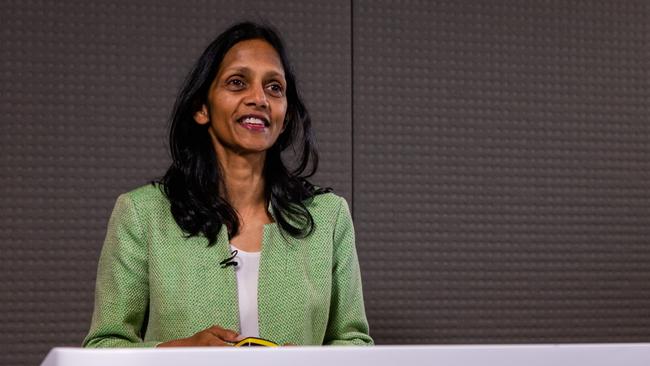Macquarie CEO Shemara Wikramanayake tips further energy market volatility
Shemara Wikramanayake cautions against ‘blowing up the mandate’ for the transition away from traditional energy sources.

Macquarie Group boss Shemara Wikramanayake expects energy market volatility to remain “for some years” and anticipates a bigger lift in fossil fuel use in the near term amid ongoing geopolitical tensions.
But the high-flying executive, who has led the ASX-listed Macquarie since 2018, still sees a corresponding greater push toward renewables as she cautioned against industry moving too quickly.
Speaking at an Association of Superannuation Funds of Australia event on Wednesday, Ms Wikramanayake warned on the risks of “blowing up the mandate” for the transition away from traditional energy sources.
“We have to think about how we do this balanced transition. People need energy and if we end up creating energy scarcity, we could lose the mandate for the transition,” Ms Wikramanayake said.
“The coal industry is very profitable but it is going to run off. The people of Newcastle, the people of Australia need new industries, we need new reskilling for jobs. Let’s not go so fast that we blow up the mandate to do this, because without the solutions we can’t switch. We can’t just shut off all the energy and go back to living like cave people.”
Macquarie, now with $750bn in assets under management, has spent two decades investing in renewable energy, taking what Ms Wikramanayake termed a strategy of “patient-adjacent growth” to find assets that would deliver on both the renewable energy side as well as on the investment return side.
“We put small bets on and learn a little bit about each new technology, bring in people in related expert areas with us, and then where things are going well and we‘re building expertise, we double down. Or if things are not working out as we hoped, we back away from it.”
“We have, over those couple of decades, invested or arranged $63bn into investing in the climate change response. And we now have 50 gigawatts of clean energy under operation or development around the world. That is double the installed capacity of green energy in Australia alone,” Ms Wikramanayake told the conference.
The next steps are to scale up the strategies that are becoming economically rational options and to move into new areas, she added, saying that higher prices for traditional energy sources had made renewables more competitive.
“We’re working in areas to address that problem of things like battery storage, micro grids, also carbon capture and storage use. Hydrogen is an area we’re putting a lot of effort into trying to develop a source of base load renewable energy.”
Macquarie has made a net zero 2025 commitment for its scope one and two emissions and has committed to 2050 for net zero scope 3 emissions. It is expected to put out a detailed plan on its 2030 ambitions this year. It has committed to run off its lending and equity investments to coal by 2024.
Europe’s move to reduce its dependence on Russia as an energy source will help drive fossil fuel use higher in the near term, Ms Wikramanayake predicted.
“I think (volatility in energy markets) will be with us for some years because Western Europe has basically decided they can’t be dependent on Russia for energy. We’ve seen not just places like China and Poland, say they’re going to lift their coal investment and production but even Germany.
“But at the same time they’re doing that, they are all making bigger commitments to things that help on the climate journey. So I think what’s playing out in energy now, it’ll be there for some years and it means we are going to have a pick-up in fossil fuel energy. It is also, in parallel, pushing the journey to renewables along.”
Separately, speaking on Macquarie’s long history of investing overseas, Ms Wikramanayake’s first piece of advice to superannuation funds embarking on their own offshore investing journey was to get local expertise in place.
“You really need to understand the local markets you go into. What we do (at Macquarie) is try and get locals with us, either by partnering or hiring people, because there are nuances of regulatory frameworks (in each market).
Secondly, she said super funds looking to buy larger assets should team up with a bigger player to benefit from their expertise.
“Get an expert manager, someone who’s learned on their own dime, and set up a structure where it’s clear to everyone else to whom the asset is accountable.
“If things go wrong early on and you have a Macquarie or Brookfield, or whatever, it’s clear to all the stakeholders that that’s who is driving it. You’re coming in to support (the deal) and then make sure you have control for key things in terms of step-in rights.”




To join the conversation, please log in. Don't have an account? Register
Join the conversation, you are commenting as Logout